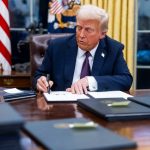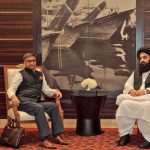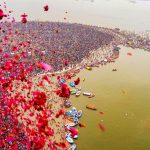![All Sound and No Fury at G7]()
(L-R) Canadian Prime Minister Justin Trudeau, President of the European Council Charles Michel, US President Joe Biden, Japanese Prime Minister Yoshihide Suga, British Prime Minister Boris Johnson, Italian Prime Minister Mario Draghi, French President Emmanuel Macron, President of the European Commission Ursula von der Leyen and German Chancellor Angela Merkel on the sidelines of the G7 Summit in Carbis Bay, Cornwall, June 11 (Photo: Getty Images)
EUROPEAN POWERS COLONISED the world in three phases. In the first, the seafaring nations of Portugal and Spain colonised South and Central America in the 1400s. In the second, Britain, France and the Netherlands swept West and East in the 1600s to colonise North America, Africa, Asia and Australia.
Both phases ended by the mid-1900s. Having enriched themselves and their surrogate colonist-settlers in North America and Australasia, Europe paused. The new world order in the 1950s had created a powerful new enemy for the West in the Soviet Union and the Warsaw Pact powers.
The colonies were gone but the West evolved new weapons to keep the world in line: the United Nations Security Council (UNSC), International Monetary Fund (IMF) and World Bank (WB). They controlled global security and finance.
The rise of China, one of the five veto-carrying members of UNSC, complicated matters. Russia, the fifth veto-holder as successor state to the Soviet Union, was a growing threat.
The US and Europe tried co-opting Russia in 1997 by inviting Moscow to join G7, expanding the body into G8. The West then set about breaking the pledge it had made to Russia that NATO would not “move an inch” eastwards. Between 1997 and 2014, NATO granted membership to 11 European countries, including the former Soviet Union’s satellite states. The US then engineered a coup to oust the pro-Russia Ukrainian government of President Viktor Yanukovych in 2014. Russia reacted by annexing Crimea.
Russia was summarily expelled from G8 which, after 17 years, reverted to G7. A scattered conflict had meanwhile begun in 2014 between armed Russian-backed groups and US-backed Ukrainian nationalists in eastern Ukraine. In February 2022, Russia launched a full-scale invasion of Ukraine.
Apart from US-led wars in the Balkans in the 1990s that broke Yugoslavia into seven countries, Europeans had not killed one another in war since 1945. The current war in Ukraine therefore cuts deep into Europe’s sense of self.
Europe has tried everything—from arm-twisting to diplomacy—to stop India from buying Russian crude and subsidising the sanctioned Russian economy. It has failed. India’s External Affairs Minister S Jaishankar said bluntly at last month’s Raisina Dialogues in New Delhi: “Russia is turning more towards Asia and other parts of the world. It makes sense to give Russia multiple options. If we railroad Russia into a single option, and say that’s the outcome, then you are making it a kind of a self-fulfilling prophecy.”
What Europe couldn’t achieve once the colonial age was over it now seeks to achieve with two new weapons: global trade through the World Trade Organization and climate change through the Intergovernmental Panel on Climate Change
Share this on 

As the US—which will be a coloured-majority country by 2050—shifts its attention away from Europe to an assertive China and the ruptured Middle East, Europe’s anxiety about its future has risen. It has noted that over a hundred countries in the Global South from Asia, Africa and South America, many of them former European colonies, no longer back Europe on Ukraine.
Jaishankar summed it up well when, in the early months of the Russia-Ukraine war, he said: “Europe has to grow out of the mindset that Europe’s problems are the world’s problems, but the world’s problems are not Europe’s problems.”
What Europe couldn’t achieve once the colonial age was over it now seeks to achieve with two new weapons: global trade through the World Trade Organization (WTO) and climate change through the Intergovernmental Panel on Climate Change (IPCC).
At the 13th ministerial conference of WTO in Abu Dhabi recently, the European Union (EU) tried for the first time to include in the WTO’s agenda new issues of carbon tax, industrial subsidies, gender equality, investment, and climate change.
India, South Africa and other developing countries pushed back, saying WTO was exclusively a global trade body and non-trade issues must be decided at forums built specifically for them, such as IPCC.
Europe’s arbitrary new carbon tax is targeted at developing countries under the guise of global warming. For over 200 years, Europe and the US, while industrialising, spewed 90 per cent of the CO2 that pollutes the world’s atmosphere. Instead of compensating developing countries for retarding their industrial growth during the colonial era, the West seeks to penalise those it exploited for centuries with new rules detrimental to them.
Showing unusual assertiveness in Abu Dhabi, the Indian delegation named the US as obstructionist: “WTO members noted that the appellate body—the appellate arm of the dispute settlement system—had been non-functional since December 2019 due to the blocking of appointment of its members by the US.”
The third phase, Colonialism 3.0, is the most insidious.
About The Author
Minhaz Merchant is an author, editor and publisher
/wp-content/uploads/2021/06/G7.jpg)

/wp-content/uploads/2025/01/Cover-Indian-Music.jpg)













More Columns
Israel-Hamas Ceasefire: Five things to watch out for in the days to come Rahul Pandita
Trump’s First Day at Work Siddharth Singh
What Are the Natural Solutions for Acidity and Bloating Dr. Kriti Soni